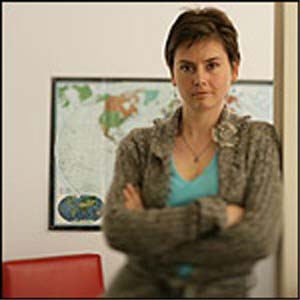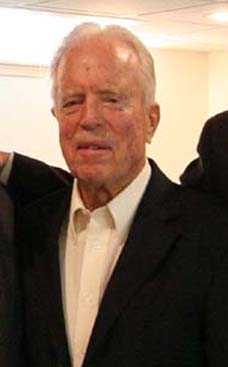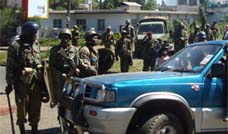
McGuckin learned that the vulnerability of Baltimore’s new refugees was not all that different from the villagers in Madagascar. "The language and literacy barriers people encounter here have an even greater impact," said McGuckin, who worked as a nurse manager at the Baltimore jail last year. "The health challenges that arise from low literacy levels present challenges that seem more pressing here when you don’t speak the language." Since January 2007, McGuckin has trained small groups of refugees and asylum-seekers to become community health workers who can serve as advocates and resources for other refugees in Baltimore. They are learning how to navigate the American public health and entitlements systems so they can help other newly-arrived refugees do the same. They are learning about chronic disease and home hygiene so they can teach their neighbors about health challenges they may encounter in the United States. Two groups started in January—a group of women from Somalia and Sudan and a group of Turkish women from Uzbekistan. Another group from all over Africa began July 1—they hail from Ethiopia, Cameron, Liberia, Sudan, the Ivory Coast, Guinea, and Gambia. After the 10-week training, that class graduates in fall 2007 and will train others in 2008.
Madagascar RPCV Aisling McGuckin nterned for the International Rescue Committee’s Resettlement Center in Baltimore, assessing the health needs of Somali Bantu women
Aisling McGuckin
Baltimore, Maryland
2006
After graduating summa cum laude from Regis College, Aisling McGuckin trained villagers in farming, soil conservation and beekeeping as a Peace Corps volunteer in Madagascar. Upon returning, she earned degrees in nursing and public health from Johns Hopkins University and interned for the International Rescue Committee’s Resettlement Center in Baltimore, assessing the health needs of Somali Bantu women.
In recent years, some 2,000 refugees have resettled in Baltimore from Somalia, the former Soviet Republics, Sudan and the Congo.
McGuckin learned that the vulnerability of Baltimore’s new refugees was not all that different from the villagers in Madagascar. "The language and literacy barriers people encounter here have an even greater impact," said McGuckin, who worked as a nurse manager at the Baltimore jail last year. "The health challenges that arise from low literacy levels present challenges that seem more pressing here when you don’t speak the language."
Since January 2007, McGuckin has trained small groups of refugees and asylum-seekers to become community health workers who can serve as advocates and resources for other refugees in Baltimore. They are learning how to navigate the American public health and entitlements systems so they can help other newly-arrived refugees do the same. They are learning about chronic disease and home hygiene so they can teach their neighbors about health challenges they may encounter in the United States.
Two groups started in January—a group of women from Somalia and Sudan and a group of Turkish women from Uzbekistan. Another group from all over Africa began July 1—they hail from Ethiopia, Cameron, Liberia, Sudan, the Ivory Coast, Guinea, and Gambia. After the 10-week training, that class graduates in fall 2007 and will train others in 2008.
McGuckin spent the first few months of her fellowship writing a curriculum that includes leadership development, an overview of American health care, planning and evaluating programming in communities, and health education, focusing on chronic illness, wellness and mental health. They also discuss their insider and outsider roles as health leaders who are still able to operate inside the culture.
Two students from Johns Hopkins’s School of Public Health and Business are starting a study to determine whether there’s a market for the community health workers to be paid consultants to various agencies, such as hospitals and the Department of Social Services.
McGuckin has seen her students grow in confidence and savvy. At the beginning of the training, her students often asked "Can you do this for me?" Today, as they are more aware of available community resources, they might ask: “Who do I need to talk to address this issue?” They are learning to solve problems for others in their communities, such as a neighbor who has rodents in his home or a mother who needs her children transferred to another school. Or where to go for energy assistance or food stamps or medical care. Says McG









